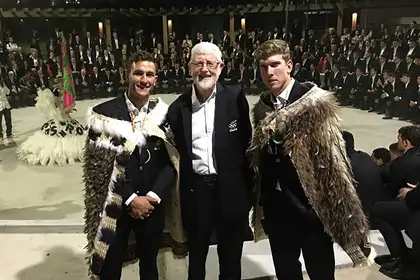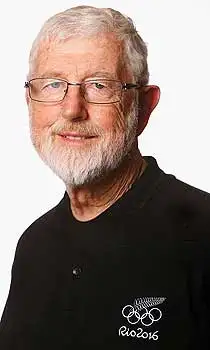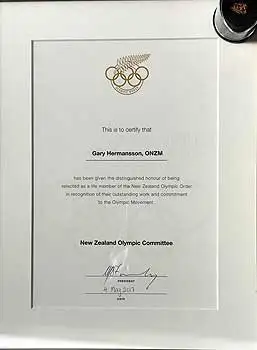
Professor Emeritus Gary Hermansson, flanked by Kiwi flag bearers and sailing competitors Blair Tuke and Peter Burling at the 2016 Rio Olympic Games.
Professor Emeritus Gary Hermansson from the School of Sport and Exercise has been honoured for his service to the Olympic and Commonwealth Games.
Professor Hermansson was awarded the Olympic Order of New Zealand, alongside Olympians Barbara Kendall, Trevor Shailer and Selwyn Maister, by the New Zealand Olympic Committee in Auckland on May 4.
For close to 20 years, spanning 10 Games campaigns, from the Kuala Lumpur Commonwealth Games in 1998 to the Rio Olympic Games in 2016, Professor Hermansson has ensured New Zealand’s athletes have been prepared for competition.
As Team Psychologist, his focus has been on what it takes to be mentally ready. He has also been an influential member of each Games’ leadership team and contributed to the creation of the Games unique and athlete-focused team environment.

Professor Emeritus Gary Hermansson.
Professor Hermansson has also contributed to conflict resolution, guidance and advice, team building and succession planning for the Games.
Speaking at the New Zealand Olympic Committee’s General Assembly, where he received the Order, Professor Hermansson said it was a tremendous privilege to be involved with the Commonwealth and Olympics Games during the past 20 years.
“It has been a great privilege to work with all of you, and a number of your predecessors, as the leaders who guide and shape sporting contributions to the nation. It has been a special privilege to have worked so closely with the athletes, at times on a very personal level, as they strive to handle the tremendous pressures of competing at the top levels of competition.
“It has been a privilege to be a part of the New Zealand Olympic Committee family for such a lengthy period, striving to pull together the very best elements to establish a high performance environment that is meaningful, identity-defining and purposeful for the nation's top athletes to perform to their very best.”
Professor Hermansson also looked back to his first Commonwealth Games in Kuala Lumpur. “It was a rather lonely and isolated experience, as in those early days sport psychology was regarded as something called upon only when there was a problem. When I met up with athletes, even in casual situations, their discomfort was obvious, but as the realisation grew that the mental elements of performance are crucial for consistent high-quality delivery, it became increasingly common for athletes to actively seek out my involvement.
"We, in psychology, are developing greater understandings all the time of how the mind functions in performance pressure situations and I believe this domain will become increasingly important to all in sport in the years to come.”

The Olympic Order of New Zealand was awarded to Professor Hermansson last week in Auckland.
Professor Hermansson is understandably sad to be reaching the end of his involvement with the Games, but will continue to work with athletes in other contexts.
“I am reminded of something that Georgina and Caroline Evers-Swindell shared with me when they retired from rowing after the Beijing Olympics. On a card they sent me at the time, they said that their mum had told them that they 'shouldn't be sad that it was over, but be grateful that it happened', and that is a message that is also very apt for me at the moment. I am tremendously grateful and appreciative of all who have been part of my Games’ experiences, and thank you all for your various contributions to that journey.”